- Home
- S. E. Lynes
The Housewarming: A completely unputdownable psychological thriller with a shocking twist Page 6
The Housewarming: A completely unputdownable psychological thriller with a shocking twist Read online
Page 6
Neil nods. ‘We could call in for an hour, I suppose. Show our faces.’
‘Great. I reckon the whole street will be there. Pete Shepherd told me they spent six grand on the lighting alone, and he’s seen all sorts being delivered in the last six months or so. Apparently it took four men to carry the flat screen in. Four blokes! It’s like we’ve got our own resident rock stars.’
Neil huffs. ‘Don’t let Lovegoon hear you say that. He can barely get his head out of his front door as it is.’
Matt laughs. ‘No, but I think people are a bit fascinated with them – well, they seem to be anyway. She’s very glamorous, isn’t she, the wife? Jennifer? Chic, I suppose you’d say. Classy. And I guess we’re all curious to see what the best part of a year’s work and vast amounts of cash can do to a place. It’s bound to be a palace; well, you know what it’s like better than anyone.’
Neil shrugs. ‘It’s big, I can tell you that. I never saw it finished, never saw the zinc effort they put in the garden, but it’s just a house at the end of the day. Just bricks and cement.’
‘True.’ Matt knows Neil doesn’t believe this any more than he does. A house is more than its material components, and an ambitious conversion is always exciting to see. Besides which, Matt is keen to meet his neighbours properly after the terrible way they were introduced.
He glances up at Neil, who is staring at the ground. He’ll be fine once he gets there, Matt thinks. A few beers and he’ll forget his loathing of Johnnie Lovegood, not to mention the four of them getting together for a drink for the first time since that day. It’ll do them all good.
‘So,’ he says. ‘Shall we have a livener at ours first then?’
‘Sure.’
The sweat is cooling against Matt’s skin. He shivers and, taking this as their cue, they lean in, clap each other on the back.
‘Later, mate,’ Neil calls, already a few paces down the road.
‘Later,’ Matt replies, without turning, sliding the key into the lock.
In the living room, Ava is watching television, Fred at her breast. It is a little after half past nine.
‘Hey,’ he says from the doorway, wiping his face with the bottom of his T-shirt.
‘Good run?’ She glances up at him, her smile wary.
‘Neil didn’t have a heart attack, so all good. Do you want to watch something once I’ve had a shower?’
She shakes her head. ‘I’m going to go to bed when I’ve got him down.’
He nods, aware of himself nodding, of making himself stop. ‘I’ll grab a shower then.’
By the time he returns downstairs, Ava is settling Fred. By the time he gets to bed, she is asleep. By the time he gets to sleep, the birds are shifting on their branches, impatient to greet the dawn with sweet songs he knows are anything but. They are territorial war cries; they are warnings.
Seven
Ava
I am almost at my door after an emergency dash to the corner shop when I spot Lizzie from down the road heading towards me at full speed in her customary designer Lycra and carrying two large glossy cardboard bags with rope handles. I know it’s too late to pretend not to have seen her, know it even before she calls out to me: ‘Ava! Ava, hi!’
No escape. She has broken into a jog. But still I try to get to my door before she collars me.
I fail.
‘Lizzie,’ I say, stopping at my gate, digging in my bag for my keys.
‘Hi there.’ She swings her bags to and fro. One of them says L. K. Bennett on the front, the other Whistles. ‘Just been into town for shoes and a frock.’
‘Right.’ I glance towards my front door, realise this might be rude, return my attention to her. My smile is perfunctory, but it will have to do.
‘Just fancied something new to wear for the big do, you know?’ She says ‘big do’ ironically, nodding towards the Lovegoods’ house and widening her eyes. I don’t believe her irony – she is clearly beside herself with an excitement that feels very real. ‘Can’t wait to see what they’ve done with the place, can you?’
‘I bet it’s amazing.’
This I say to appease her obviously. The fact is I couldn’t give the most infinitesimal hoot. I am in the minority, however – I know that. The Lovegoods’ year-long refurbishment has been the talk of the street, fuelled by an endless stream of tradespeople coming and going. I have seen them myself, from the enviable vantage point of the house next door, teams of them, like those brave DIY warriors on home-improvement shows: carpenters in goggles spraying sawdust fountains in the front garden; decorators whistling on high ladders, hair and eyelashes white with paint particles; hints of the latest colour trends glimpsed through open upstairs windows; furniture and lighting deliveries from shops I hadn’t heard of; all sorts of high-tech appliances – a two-metre-wide induction hob, a flat-screen television the size of a ping-pong table, an exercise bike, a gaming chair… at least I think that’s what it was, either that or the actual command seat of the Starship Enterprise. I’m sure I was supposed to relay all of this in breathless gushing tones to Matt when he got in from work each day, but as I say, there is no overestimating how little I care.
‘Are you and Matt going?’ Lizzie asks.
‘Ah, I’m… I’m not sure.’
She screws up her face, her head tilting inevitably to one side. ‘Of course, of course. Sorry, that was silly of me.’
‘No, not at all.’
‘How are things?’ She adds a nose wrinkle.
‘Fine.’ I wish she’d straighten up her head; she’s going to get a stiff neck. ‘I’m fine. I’d better…’ I hold up the nappies, the reason for my enforced trip out. ‘Fred needs…’
‘Right you are.’ Her smile is a rictus grin; she looks like she’s stubbed her toe. ‘This little fella’s grown so much! I can remember when my two were…’ She looks away, possibly for an exit sign. ‘Anyway,’ she says, with the briefest touch to my upper arm, ‘I’d better let you go. Hopefully see you at the party! Apparently they’re doing Brazilian cocktails. Louise saw Johnnie. They’re having a bar in the garden. Anyway, I’ll let you go.’
‘Yeah. Yeah. Cheers. See you.’
By the time I get to my front door, I’m sweating, frantically scrabbling around in my bag for my keys, praying no one else sees me and tries to talk to me. By the time I get inside, I’m crying. Another few seconds later, I’m sitting on the floor under my front window, sobbing violently now, dropped out of sight like a fugitive. I’m in hiding; that’s how it feels – actually, that’s how it is: every encounter out in the world a tense and risky business in my own self-imposed witness-protection programme.
Lizzie is not alone in being someone I dread bumping into, but she is one of the worst. I can still remember her calling round a few days after that day under the pretext of dropping off a vegan pasta bake, how her questions felt more like interrogation than concern. By then, the fact that I’d left the door open had spread like the gossip it had become. So, you’d left the door open or it had banged open or what? I mean, I’m not saying… it could happen to anyone. I told her I’d left milk on the stove, pretty much shut the door in her face. Suspicion is yet one more thing I have had to get used to.
That day, just hours in, I could already feel it, can still feel it coming at me in waves from Lorraine Stephens when I put myself there, as I do every day: Lorraine, that day, sitting close, holding my hand as the tea she has made me goes cold. Lorraine, beneath her veil of concern, spying on me. Moment by moment, beat by beat, how she watches for signs of anomalous behaviour, angling the conversation to discover if there is anything dysfunctional – post-natal depression, sleep deprivation, murderous intent. I am a suspect, sitting there in my despair. But she keeps it hidden.
‘We’re close,’ I tell her when she asks about my relationship with my daughter. ‘Very. She’s my little girl, you know?’
She is my life, my love, she is part of me as my limbs and bones and organs are part of me. Do you have children, Lor
raine? Would you ask that question if you did? What the hell do you mean, what is my relationship with my daughter? She’s my daughter; I’m her mother. She’s two, for God’s sake… These are all the thoughts I keep hidden, even in my darkest hour. It isn’t Lorraine Stephens’ fault that I want to punch her in her sympathetic face.
‘Does she let you sleep?’
‘Most of the time.’ A lie. She wakes me at least three times a night.
‘You get so tired, don’t you?’
‘All mums get tired.’
Fuck off, Lorraine. You’re not getting me that easily. The truth is, Abi often sleeps in our bed, exhaustion trumping the parenting handbook. I lie awake, pushed to the edge, body tense with the effort of not falling onto the floor while Abi and Matt sleep like angels. Sometimes this is what love is.
‘They’re terrors at two, aren’t they?’ Lorraine insists companionably, but the subtext clangs in my ears.
‘She’s a good girl. I never take my eyes off her, never.’ I break down in front of this nosy stranger. Happy now, Lorraine? Happy now you’ve pushed me to yet more tears? ‘I’m very careful,’ I sob. ‘I only went upstairs because she was clipped into her buggy. I didn’t realise the front door had banged open. I’m a good mum.’
‘I know you are, love.’ She pats my hand.
‘I always put her in the travel cot when I leave the room. I never left her on her changing table. When she rolled for the first time, I was right there. She would have fallen on the floor if I’d left her.’
The sun has moved to the side of the house. The kitchen is by turns brighter and darker as clouds pass across, bringing showers that stop as suddenly as they start. A tall woman in trousers and a lightweight black mackintosh strides slowly past my patio windows. A moment later and she’s in my kitchen. My home – a public space.
‘Mrs Atkins,’ she says. ‘I’m Detective Inspector Sharon Farnham, I’m leading this investigation. Can I sit down?’
I nod. ‘Of course.’
DI Farnham sits on the opposite sofa. She pauses, brushes her chin with her thumb once, twice, three times before meeting my eye once again. Her eyes are hazel – and kind. She’s older than me. Forty, forty-five. She tells me how upsetting this must be, and that’s she’s sorry. She tells me they’re doing everything they can.
‘I just want to go over a couple of details,’ she says. ‘You told the dog handlers that your daughter fell on the pavement and that’s the reason for the blood there, is that right?’
‘Yes.’
‘Is there any reason you left that out when you spoke to my colleagues earlier this morning?’
‘I… They said they weren’t taking a statement, they just needed information. I was trying to keep it relevant. I wanted them to go as quickly as they could.’
‘I understand that. Of course you did. Could you tell me now exactly what happened?’
‘I told DS Simmonds.’
‘I know that, but can you tell me again, in your own words? Let’s bring it back to when you first left the house with your husband.’ She holds my gaze; it is me who breaks it. I wish Matt was here.
‘I’ve been trying to get out for a walk when Matt leaves for work in the mornings,’ I begin, ‘because Abi’s always up by then and I’m trying to make sure we get out and get some fresh air every day.’ I shake my head, aware that I’m waffling already. ‘Anyway, Abi wanted to get out and walk. I told her to wait till we’d said goodbye to Daddy, but she’s stubborn and she tried to get out while we were moving. I hadn’t fastened the clasp at that point and she fell and took the skin off both her knees and grazed her hands.’
DI Farnham scribbles on her notepad and looks up. ‘Was she distressed? Did she cry at all?’
‘Not really. She gave a shout, but not loud or anything. She was shocked, but then she was more fascinated than anything else. She’s pretty feisty. She told me “My got a hurt”, but she was OK.’
‘But there was blood on the pavement?’
‘Yes. It looked worse than it was.’
‘And did you take her home at that point?’
‘No, we… I mean, I was intending to but she wasn’t distressed or anything so we walked Matt to the corner to wave him off.’
Only a few hours ago, my God. Matt kissing me on the lips at the end of our road, pressing his hand to my belly. Crouching down so he could be at eye level with Abi. I can still feel her hand in mine.
‘Bye bye, Mr Sloth.’ Matt plucked the cuddly toy from her grasp, teased her with it.
‘Stobbit. Stobbit, Daddy.’ Her tiny fingers reached out. They were reddish-pink with blood from her knee. ‘No, Daddy. Mines.’
His grin bright and tender, he gave it back. I love him – I can remember that thought washing over me in a hard-rolling wave. I love these two people more than anyone else in this world.
I don’t share this with DI Farnham. I don’t tell her how, as he stood to fasten the chin strap of his silver bike helmet, I noticed the paler strip of stubble at the bottom of his sideburns where he’s growing them a little longer. I don’t tell her that I thought about how, in a couple of months, he would grow a moustache for Movember and how that would be a source of great amusement for us both. Zapata or goatee? Curled with oil like a Victorian or boxed like Hitler? I don’t tell her that I’m thinking now that these are questions we will never ask. Jokes we will never share.
‘And then he went,’ is what I tell this grave, unflinching woman, now, in my kitchen. A last wave and he clipped his feet into the cleats and pushed out towards Thameside Lane. The muscles on his calves flexed and relaxed as he powered the bike forward. I watched him: the wide reach of his shoulders, one dipping, then the other, in his tight red cycling top. I watched him cross over to Kevin, on the opposite corner, who was armed with two empty orange bags for life – an early supermarket run, no doubt, beating the crowds.
‘Kevin saw us,’ I say to DI Farnham. ‘I don’t know his surname but he lives just across the street so you can check with him. Matt stopped for a quick chat. He’s like that. He always gives people the time of day.’
DI Farnham almost smiles. ‘And then you took your daughter home?’
‘Well, I looked down and she was sort of painting blood onto the paving stone with her fingers, mucky pup. That’s why there was more blood on the corner. She’ll be a surgeon one day…’ My eyes fill.
‘I know this is difficult, Mrs Atkins, but we’re building up as clear a picture as we can. You say your husband went to work. What time was that?’
‘It was around quarter to eight.’
‘And you went home at that point?’
‘Yes. I took her home and cleaned her hands and knees. She was delighted because she was bleeding enough for a plaster. She loves plasters. And then I went upstairs for my phone.’
‘And what time was that?’
‘When I went upstairs? I’d say it was a little before eight. Five to, something like that.’
‘So she could have left at that time?’
I shake my head. ‘No, she was settled. She had her toy and I’d told her to wait. The earliest she would have become restless would have been five past, ten past. And I would have heard her shouting. She would have shouted for me.’ Why didn’t she? I wonder, the question chilling my blood. Why didn’t she shout for me?
‘And you came down at quarter past?’
‘Around then, yes. And she was gone.’
There is a pause, which DI Farnham eventually fills. ‘So you said you left the clasp undone earlier, when you walked out with your husband. Do you often leave the clasp undone when your daughter’s in the buggy, Mrs Atkins?’ Her tone is not suspicious. Her face is open. Her eyes are on mine.
But still.
I make myself lock eyes with her. ‘Not often, no. But if I know she’s only going to be in there a few minutes, sometimes I might not clip her in. She’s never thrown herself out of it before, but she had one on her this morning, as my mum would say. She’s two. T
wo-year-olds can be very… stroppy, I suppose. And Abi’s determined, you know? We always say it’ll get her somewhere in life.’ I sound defensive, I know I do. I start to cry. ‘I didn’t shout at her, but I… I told her off. And I know she was clipped in when we got home because I put her in there to bathe her knees and dress them and I didn’t want her falling out again, only I didn’t realise she knew how to unclip the clasp and I didn’t realise the front door hadn’t closed properly.’
‘Try not to upset yourself, Mrs Atkins. We’re doing everything we can. We’ve taken prints from the buggy, so we’ll need yours and your husband’s but only so we can eliminate those, plus anyone else you think might have touched it in the last twenty-four hours. I just needed to clarify how the blood came to be on the pavement. It’s so we can focus the investigation in the right way, all right?’
A short silence settles upon us.
‘And you say you called your husband around half past eight, quarter to nine?’
I nod.
‘He works in Chiswick,’ she adds. ‘That’s what, half an hour’s cycle? But he wasn’t yet at Richmond.’
I don’t like her tone. I don’t like it at all.
‘He got a puncture,’ I say, meeting her eye. ‘It must have been a tricky one to fix.’
After a moment too long for comfort, the detective asks me if I know anyone who owns a green or possibly dark grey BMW sports utility vehicle.
I shake my head. ‘I don’t think so, why?’
‘We have two witnesses who said they saw a vehicle of that description driving too fast down Thameside Lane at approximately quarter past eight. That might be a little early.’
I sit bolt upright. ‘No, she could have been outside by then. The car might have come from our road?’
She nods. ‘Anyone you know have a vehicle like that?’
I shake my head but my mind races. ‘I don’t think so, but if I think of anyone I’ll let you know.’

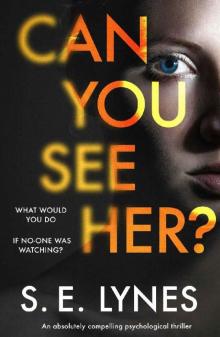 Can You See Her?: An absolutely compelling psychological thriller
Can You See Her?: An absolutely compelling psychological thriller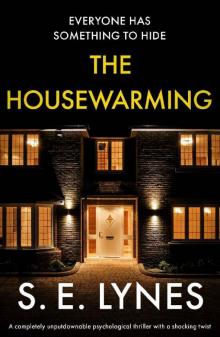 The Housewarming: A completely unputdownable psychological thriller with a shocking twist
The Housewarming: A completely unputdownable psychological thriller with a shocking twist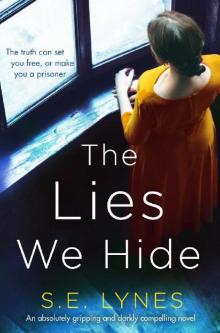 The Lies We Hide: An absolutely gripping and darkly compelling novel
The Lies We Hide: An absolutely gripping and darkly compelling novel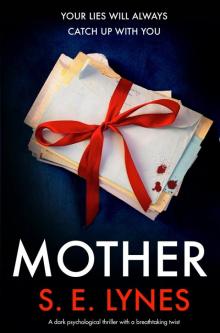 Mother
Mother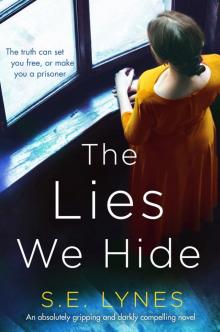 The Lies We Hide (ARC)
The Lies We Hide (ARC)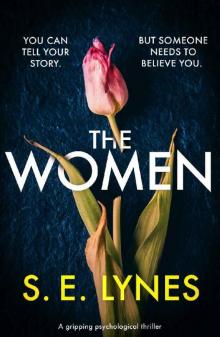 The Women: A gripping psychological thriller
The Women: A gripping psychological thriller Valentina
Valentina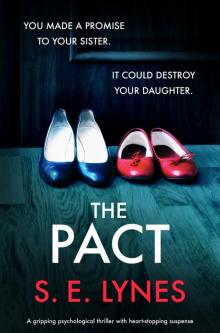 The Pact_A gripping psychological thriller with heart-stopping suspense
The Pact_A gripping psychological thriller with heart-stopping suspense Valentina: A Hauntingly Intelligent Psychological Thriller
Valentina: A Hauntingly Intelligent Psychological Thriller